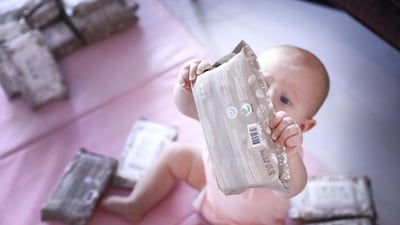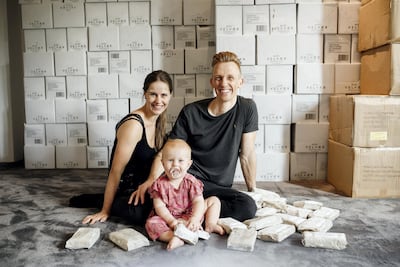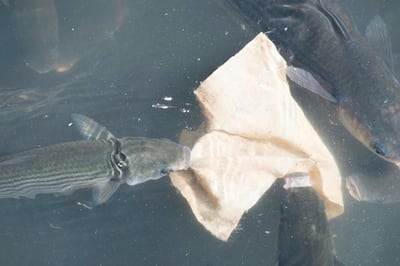If you type "baby wipes" in the search bar on Mumzworld.com, you'll get more than 20 pages of results that will make mention of more than 40 brands – from the mainstream Johnson & Johnson and Pampers to BabyU, which enriches its wipes with goat's milk, and Caboo, which creates its wipes using bamboo.
Convenient but controversial
Parenting blog Toddler Guide estimates that one household with a single child uses more than 1,000 baby wipes each year. However, the product is sometimes deemed to have an adverse effect on newborns, babies and infants – especially those with sensitive skin. In fact, baby wipes have been in and out of the news for the possible threat they pose – last month alone, a UK mother urged a leading brand to recall its wipes after one allegedly burnt her daughter's face, while in Manila, a handful of baby-wipe brands were banned due to harmful chemical compounds found in their formulations.
A poll of 235 mothers on the Real Mums of Dubai Facebook group, too, showed that 40 per cent have either had bad experiences with baby wipes in the past or avoid using them altogether, citing rashes and red patches as side effects of some brands.
Paediatrician and child specialist Dr Bariah Dardari from Dubai explains that wipes can be harmful to babies and infants in two ways. “They can irritate the skin by causing friction, especially if the child already has a condition such as diarrhoea or an allergic rash. The other way wipes can cause irritation is from certain ingredients in the wipes, including preservatives.
"There are ingredients in many wipes that are chemicals and may be considered toxic. Even wipes that are marketed as hypoallergenic can contain these, and the problem is some brands don't disclose all of the chemicals. Although they may be 90 per cent water, the remaining ingredients can be harmful," she says.
Some of the effects of these chemicals, Dardari says, can be frighteningly far-reaching: “Fragrance mixes often contain synthetic chemicals, including phthalates, which are known to be endocrine disruptors. These disruptors interfere with our endocrine system and can cause lowered fertility, an increased incidence of endometriosis and even some cancers.”
Although there’s an abundance of brands on the market, Dubai management consultant and father Jacob Koch says they’re riddled with catchy phrases that are often misleading.
“It’s almost impossible to navigate through all the buzzwords. We as parents are left alone to figure it out,” he says, pointing out that some products claim to be perfume-free with only natural aromas. “This leads to so much confusion – aroma is another term for perfume, like fragrances and scents, and these are allergens that have the same harmful effects as perfume.”
The confusion and frustration is what prompted Koch to launch baby-care brand Velvaer in Dubai last year, after he and his wife, Mai, had their daughter Esther. Velvaer, which means "being and feeling well" in Danish, decided upon a package of certified safe and eco-friendly wet wipes as its first release.
Although it may seem too simple a product to centre a new business on, all parents know just how important these pre-moistened tissues are. They're a baby-bag staple and used for far more than wiping babies' bottoms. And not all parents have had a bad experience.
Wipes versus water
Marischa Landsberg, a mum of two boys who lives in Dubai, says: “Baby wipes are the best thing ever. I don’t know why I only started using them after I had kids.” Her uses include: “Wiping hands and feet, especially at the beach or in the desert, cleaning paint from the wall, wiping down the high chair in a restaurant before putting my baby’s food on it, wiping the inside of my car when something spills – the list goes on.”
For time-poor working parents who seek speed and convenience, baby wipes are a godsend. Irish brand WaterWipes, which says its product contains 99.9 per cent water and a drop of fruit extract, calls itself the "maker of the world's purest baby wipe". It is one of the most popular among UAE parents. "I use water-based wipes only," says Real Mums of Dubai group member Mirratu Isyroh Alam. "I once tried the ones with aloe vera and my baby's bum started getting red, so I stopped."
However, because of the potential risks associated with some wipes, parents and grandparents belonging to older generations often advise modern-day mums to avoid them altogether, and instead to wash their babies in the sink when changing nappies or cleaning their hands and face after mealtimes. Some parents heed this advice, and use water with soft towels or cotton wool, saving wipes for occasional outings and emergencies.
Eco conflict
Bodily effects and skin reactions aside, wipes can be detrimental to the planet, too. “Just imagine how much waste all the use of the diapers and wipes are creating, especially in cities where we don’t recycle trash,” Dardari says.
Baby-care products are the cause of widespread pollution across the globe – in landfill across Europe and the US, plastic nappies are one of the biggest categories of non-biodegradable trash, and they're also a main category of marine hazards, littering beaches and causing coral reef decay.
Wipes are no better – most are formulated with microplastic fibres that aren't biodegradable, and many parents mistakenly flush them down the toilet instead of throwing them in the bin. A study by Water UK found that in 2017, wipes made up 93 per cent of 300,000 sewer blockages in Britain. In 2018, London environmental organisation Thames 21 found more than 5,000 wipes, creating an area half the size of a tennis court along the River Thames.
It's one reason why the Kochs joined with Nordic Swan, a leading sustainability ecolabel in Denmark that offers strict environmental certifications, to ensure Velvaer's wipes are eco-friendly.
"We have taken a holistic approach and looked at the full product journey – this means that all aspects are considered, from raw material, production and consumption to disposal and recycling of the product," Mai explains. "We are not eco-fanatics, but we try to balance living a life that is practical and convenient, yet also takes the environment into consideration."
While only 22 per cent of UAE mothers polled admitted they actively seek eco-friendly baby-care products, advocates impress the importance of taking steps to positively impact the future of the next generation.
"Wipes are an environmental nightmare – we have become too dependent on them," says group member Deborah Corton. "Do I think they are overused? Yes. Do I use them? Yes – but only as a last resort."



